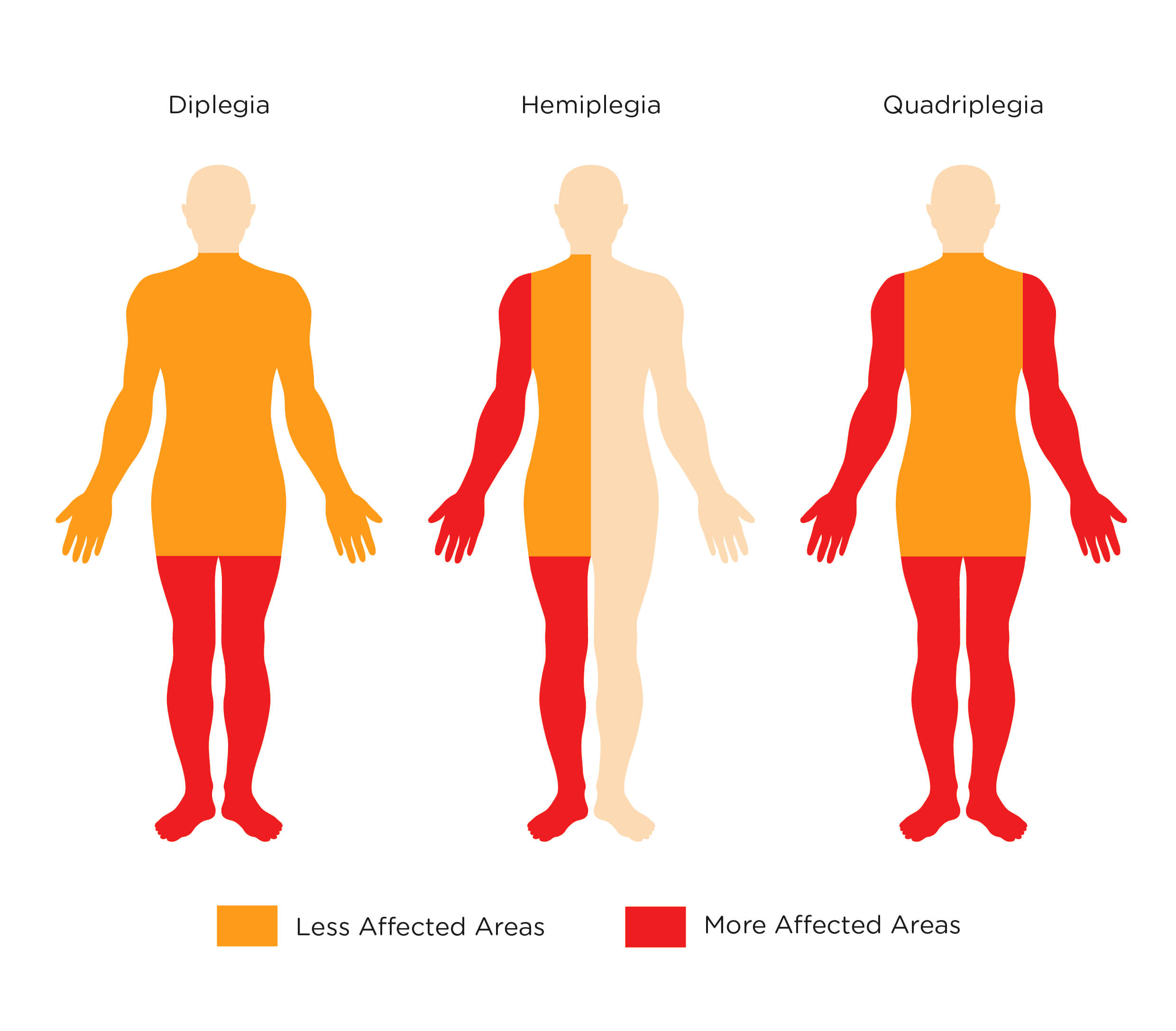Types of Cerebral Palsy
Practice Areas
Generally speaking, there are four types of cerebral palsy, which are classified by location of brain damage, the type of movement impairment, and other symptoms the condition causes. These four main types of cerebral palsy, which are discussed in detail below include:
- Spastic cerebral palsy
- Athetoid cerebral palsy
- Ataxic cerebral palsy
- Mixed cerebral palsy
Please read on to learn more about these types of cerebral palsy. It is also wise to see our section on the causes of cerebral palsy as it can help you understand why you or your child or loved one developed this condition. If medical negligence is the cause of cerebral palsy, it may be possible to seek lifetime compensation for your expenses, losses and suffering. Please contact our team of attorneys, which has a wealth of experience handling similar cases of medical malpractice. We can evaluate your case confidentially and free of charge to help you understand your legal rights and options.

Spastic Cerebral Palsy
Spastic cerebral palsy is the most common type, accounting for 70 to 80 percent of all cases of cerebral palsy in the United States. This type of cerebral palsy occurs when brain damage affects the cerebral cortex, or the outer layer of the brain, either at birth or a very young age.
Spastic cerebral palsy has a number of sub-forms, classified by the areas of the body affected by brain damage, such as just one side of the body or just the lower limbs (e.g. hemiplegic, diplegic) and the severity of the condition (i.e. mild, moderate, or severe).
This type of cerebral palsy, which refers to increased muscle tone, keeps the muscles in a constant state of increased tension. Normally, muscles work in pairs, with one set contracting while the other relaxes. This process allows for free movement. Spastic cerebral palsy brain damage hinders normal brain to muscle communication, thus disrupting the normal processes of movement. Instead of alternating between tension and relaxation, the muscles of spastic cerebral palsy patients often become active at once, causing persistent tension, or spasticity, and making movement difficult.
The effect of spastic cerebral palsy on movement and overall level of ability depends on the severity of the condition and the muscles affected. Mild spastic cerebral palsy may only impede the ability to complete specific tasks, while more severe spastic cerebral palsy may significantly affect a patient’s ability to complete most tasks.
While spastic cerebral palsy is not a progressive disease, muscle spasticity and joint contractures can get worse over time, further limiting a patient’s range of motion and ability to complete certain tasks. Anxiety and exerted effort can also exacerbate muscle spasticity in patients with this type of cerebral palsy.
Athetoid Cerebral Palsy
Athetoid cerebral palsy, also called dyskinetic cerebral palsy, affects 10 to 25 percent of all people with this condition. This type of cerebral palsy is the result of brain damage to the basal ganglia, located in the midbrain region.
As a form of athetonia, athetoid cerebral palsy is characterized by involuntary slow and writhing movements, which usually affects the hands, feet, arms and legs. In some cases, this type of cerebral palsy can also affect the facial muscles, causing grimacing or drooling. While spastic cerebral palsy is characterized by increased muscle tone and tension, this type of cerebral palsy causes mixed muscle tone, where some muscles are too tense, while others are too relaxed. Sometimes this involuntary muscle activity affects the whole body at once. The symptoms of athetoid cerebral palsy tend to diminish completely during sleep, though they often heighten during times of waking stress.
Ataxic Cerebral Palsy
Ataxic cerebral palsy, which is much less common than the two aforementioned types, affects only between 5 and 10 percent of those with this condition. This type of cerebral palsy is caused by brain damage to the cerebellum, located towards the base of the brain.
The cerebellum is responsible for orchestrating muscle movement for balance and coordination. When this part of the brain is damaged it can lead to ataxic cerebral palsy, characterized by difficulty with balance and coordination of movements. Moreover, patients with ataxic cerebral palsy may experience some or all of the following symptoms:
- Hypotonia—poor or low muscle tone
- Gait problems—such as a wide gait (walk)
- Tremors—particularly when attempting fine motor movements such as writing or tying a shoe; these are also called intention tremors because they often occur when a person tries to execute a voluntary, or intentional muscle movement.
Ataxic cerebral palsy is often whole body, affecting all four limbs and the trunk.
Mixed Cerebral Palsy
The fourth main type of cerebral palsy is mixed cerebral palsy, which is a combination of spasticity and athetoid movements. Please see above for details about these types of cerebral palsy.
To learn more about the causes of cerebral palsy and your legal rights, please contact the qualified and experienced attorneys at Injury Lawyer Omaha, Injury Lawyer Omaha and Cohn, who are here to provide the assistance you need.
Testimonials
This firm did a fantastic job handling my personal injury case. They kept me informed every step of the way with what was happening with my case and always answered any of my questions. I would highly recommend this firm. Great job
- Shateeka Spinks
I am really glad I worked with Abboud law firm. They were very helpful and accommodating. Everyone was very friendly and genuinely had my best interests at heart. I would recommend them to anyone.
- Ameneh Alhaidari
Abboud law firm took amazing care of me after my accident and was able to settle my claim wonderfully. They work very well with me and everyone involved. I would highly recommend using Abboud Law.
- Apolla Speck
Chris has been fantastic throughout this process after my accident and his staff has always been friendly and helpful. He managed to get me 3x what I expected. No complaints here. Definitely recommend.
- Jesse Charles
I had a very nice experience with Abboud!! They were very patient and understanding about my situation and kept me informed with what was going on with my settlement. Would serenity recommend
- Blake Lucey


